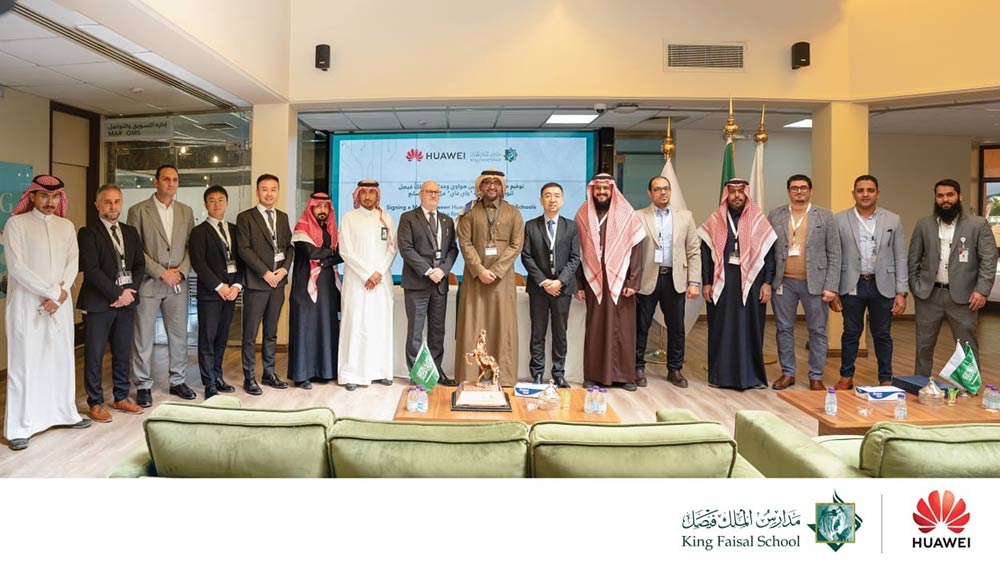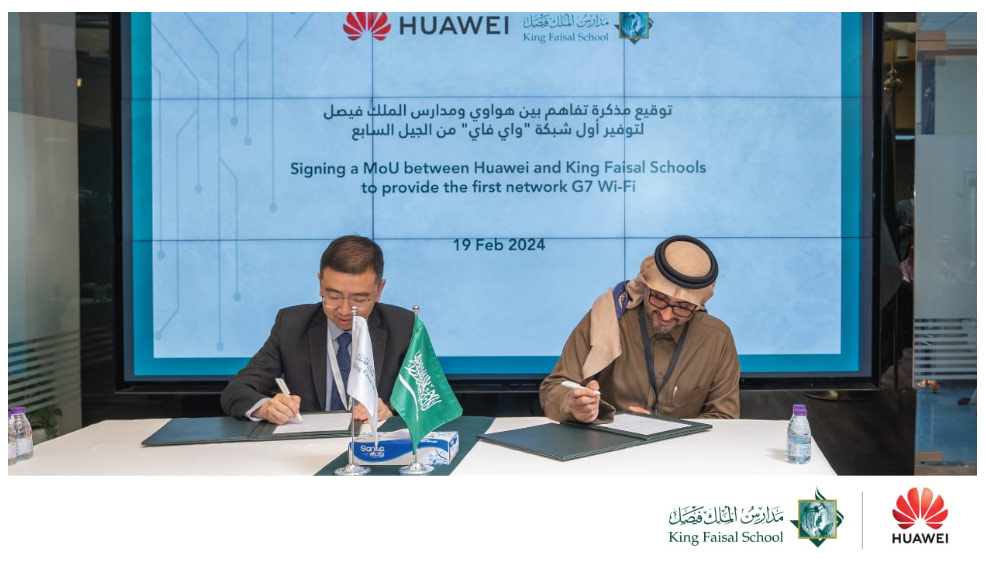King Faisal School & Huawei: Building a High-Quality 10 Gbps Campus with Ultra-High-Speed Wi-Fi 7 Network
This site uses cookies. By continuing to browse the site you are agreeing to our use of cookies. Read our privacy policy>
![]()
Enterprise products, solutions & services

The King Faisal Foundation (KFF) is an international philanthropic organization established in 1976. Until 2020, KFF has spent over 2.4 billion Saudi Riyals to support its pillar programmes, philanthropic projects, and educational scholarships, which have created a positive impact on the advancement of communities all over the world.
Against this backdrop, King Faisal School (KFS) was founded in 1991. It adopts the full-time education mode to provide world-class education services for primary and secondary school students in Saudi Arabia. At KFS, students can participate in activities such as global study tours and summer camps of top universities to get in touch with the world. Many students graduated from KSF were admitted to top universities around the world.
Saudi Vision 2030 proposes to continuously increase investments in digital education, aiming to build a world-class education environment for Saudi Arabia and provide the world with more talented people. To improve the quality of education, KFS is committed to building digital teaching experience, such as AR teaching and remote teaching. However, traditional network facilities cannot meet the demands for high bandwidth, high concurrency, and low latency. The education industry is in urgent need of upgrading basic network facilities. To address this issue, KFS cooperated with Huawei to build a high-quality 10 Gbps campus network based on Wi-Fi 7, taking a significant step forward in its digital education journey.
KFS hosts about 4K daily users and is situated over multiple locations in the prestigious DQ District of Riyadh – Saudi Arabia spanning about 50 acers of land (about 200,000 sqm). In 2023 a project was launched to upgrade various infrastructure devices of the live network for 14 buildings have been running for recent years. The wired devices became recently insufficient in bandwidth, and the wireless devices were Wi-Fi 6 models. In high-concurrency scenarios during activities, terminals occasionally experienced connection delays and insufficient bandwidth, reducing the efficiency of online teaching, teaching affairs office, and conferences. In addition, wireless locations are not properly deployed due to a lack of professional network planning in advance. As a result, office buildings have blind spots in wireless coverage, and the mobile office experience is compromised by network interruptions. Therefore, KFS invited several major vendors of advanced technologies in the market and have tested most of the leading vendor in that category, Huawei was the most advanced vendor that solves our dilemma with a future-proof, next-generation infrastructure network.
Powered by the industry-leading, innovative Wi-Fi 7 technology, Huawei's High-Quality 10 Gbps CloudCampus Solution allows students and faculty in KFS to enjoy the ultimate connectivity experience. This solution will greatly improve the Internet access experience and provide Wi-Fi services with higher speed, lower latency, and more secure connections.
With new features such as Multi-Link Operation (MLO) and 4096-quadrature amplitude modulation (QAM), Wi-Fi 7 doubles the wireless rate compared with Wi-Fi 6, bringing a qualitative leap in wireless network experience. Huawei introduces the industry's first enterprise-class Wi-Fi 7 AP AirEngine 8771-X1T, delivering a device rate of up to 18.67 Gbps, with a tested single-user rate of up to 4.3 Gbps. This can easily accommodate emerging high-bandwidth education services and support future-oriented flexible evolution.
In addition, new networks deployed in office buildings will provide Wi-Fi 7 coverage without blind spots. As such, users can access the high-speed Wi-Fi 7 network anytime, anywhere to enjoy seamless roaming of services, such as AR teaching and remote teaching.
For wired networks, Huawei deploys CloudEngine S5732-H multi-GE access switches to meet Wi-Fi 7 high-bandwidth backhaul requirements. The switches support unique RTUs for flexible downlink port rate upgrades from GE to 10GE on demand, paving the way for future service and bandwidth evolution without device replacement, fully unleashing the ultra-broadband capability of Wi-Fi 7.
Additionally, Huawei's CloudEngine S12700E core switch can provide 100GE core capability for data switching and support heavy traffic of up to 10,000 concurrent users. The redundancy design of multiple fans and power modules further ensures the stability of network devices. In this way, the always-on, high-speed networks support the normal operation of teaching services. In both wired and wireless networks, Huawei provides reliable solutions for KFS to realize the future vision of digital education.

Through the cooperation on high-quality 10 Gbps campus network powered by Wi-Fi 7, both parties have deepened consensus on the digital education journey. On February 19, KFS and Huawei officially signed a memorandum of understanding (MOU), marking the beginning of full cooperation.
Under the terms of the MOU, Huawei will provide comprehensive support for KFS, spanning multiple domains. This includes assessing KFS' current ICT infrastructure and recommending enhancements to facilitate network upgrades, secure data storage, and efficient management systems.
Additionally, Huawei will implement smart classroom solutions to integrate interactive whiteboards and digital learning platforms alongside advanced technologies like AI, IoT, and cloud computing into the curriculum, so as to prepare students for the digital future. This strong cooperation with Huawei will further accelerate KFS's digital education process, help it become a world-class education institution, and contribute to the education development in the Middle East.
Yang Zhijun from Huawei said, "We are honored to partner with KFS in this project that will set a new benchmark in educational technology. By leveraging Huawei's expertise in ICT solutions, we aim to empower students with the skills and knowledge they need to thrive in the digital age. We look forward to seeing the positive impact of this collaboration."
The cooperation between Huawei and KFF will become a model for the digital transformation of education in more education institutions, thus promoting the development of global intelligent networks, and helping more people in need.